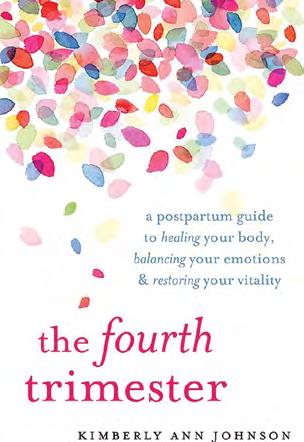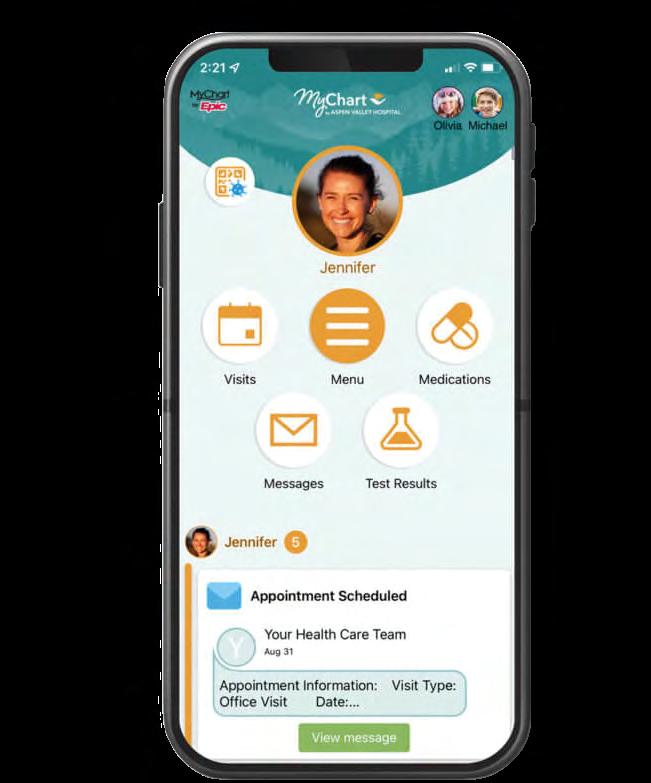
8 minute read
Leaning In:
The lifesaving power of trusting yourself
February 21st started as an ordinary day for Marion Garrett of Snowmass Village. She woke up and went to Snowmass Chapel where she works as a ministry coordinator. She felt a little lightheaded and had some soreness near her ribs but chalked it up to overdoing it at yoga the day before.
“I work with Julie Ressler who is married to Dave Ressler, Aspen Valley Hospital CEO,” Marion said. “We were in our staff meeting when Julie asked if I was okay. Just by looking at my face, she could tell something was wrong.”
Marion told Julie she was fine…she was sure it was nothing. Julie encouraged her to go to the emergency room, but Marion declined.
“I just happened to have a bone density test scheduled for that day,” Marion said. “Julie insisted I see my physician while I was there. Fortunately, Dr. Caroline Mears immediately fit me into her schedule.”
A Close Call
“Marion told me that she thought she’d pulled a muscle,” said Dr. Mears, DO, Internist. “She said she just felt ‘a little off’ but her vital signs were irregular. I ordered some lab work to rule out anything serious.”
Marion went home and received a phone call later that evening. It was Dr. Mears.
“She told me I needed to get to the hospital because there was a chance I had a blood clot,” Marion said. “I was absolutely shocked.”
Marion was suffering from a pulmonary embolism, a blockage of an artery in the lungs. She was admitted to the hospital and put under the care of hospitalist Matthew Dunn, MD.
“They monitored my condition and ran more tests,” Marion said. “I was given a blood thinner and discharged after one night. But I needed to be on continuous oxygen.”
Trust Your Instincts
Thankfully, Marion is on her way to a full recovery. And she’s looking forward to getting back to the yoga studio.
“Dr. Dunn was incredible,” Marion said. “And I couldn’t be more pleased with Dr. Mears. She could have easily dismissed my symptoms as nothing serious, but she went the extra mile. My condition was so dangerous that I could have died if I had waited even one more day to seek treatment.”
Marion’s case has a worthy lesson. If something doesn’t feel right, you should follow your instincts and seek treatment.
“It’s never silly or unreasonable to get professional medical advice,” Dr. Mears said. “And listen to your family and friends when they’re concerned. I’m so glad Julie Ressler nudged Marion to make the appointment. It may have saved her life.”
Know the Signs
Common symptoms of a pulmonary embolism include:
Sudden shortness of breath
Chest pain
Dizziness, lightheadedness or fainting
Irregular heartbeat
Palpitations (heart racing)
Coughing and/or coughing up blood
Sweating
Low blood pressure
This condition can be life-threatening. Seek urgent medical attention if you experience these symptoms, particularly shortness of breath, chest pain or fainting.


Pollinator Paradise
Turn your backyard into a summer-long garden party by adding some pollinator-friendly plants


BY AMY BEHRHORST, PA-C
If you’re looking to add a little color to your Colorado garden while also helping out some important little creatures, planting pollinator-friendly plants is the way to go.
About eight years ago I began keeping bees as a hobby, and I have never looked back. Welcoming these gentle pollinators into my garden has been a gift and an anchor, especially in recent times. But you don’t need to go all in as I did to provide a vital habitat for bees, butterflies and other pollinators. Even a small patch of your garden peppered with the right plants will allow you to see and enjoy the dynamic presence and complex lives of pollinators up close.
Here’s how to add pollinator-friendly plants to your garden in Colorado.





Pollinator Power Plants
Step 1
Location, Location, Location
Look for an area with at least six hours of sunlight daily with well-draining soil.
Step 2
Pollinator Power Plants
It’s essential to choose species that are native to the region so they can thrive in our high-mountain climate and conditions. Below are some great pollinator-friendly plants for Colorado. These beautiful plants attract pollinators such as bees, butterflies and hummingbirds with their bright colors and sweet nectar.
Step 3
Time to Dig In
Make sure to space your plants out so that they have room to grow. Also, be sure to water your plants regularly, especially during hot, dry summer months.
Step 4
Step Into Pollinator Paradise
As you sit, your senses will slow down as you hear and see your pollinator visitors at work in their colorful surroundings. You will also become more aware of their important role in our ecosystem, helping to pollinate the plants that provide food and habitat for a wide range of animals.

Becoming a mother is a massive change in a woman’s life, and it takes time to adjust to the new role. The “fourth trimester” is a traditional time period that is receiving renewed attention for being essential for both mothers and babies. Many countries around the world have customs and rituals to recognize this transformation and the need for new mothers to be surrounded with care for at least the first 30 days and beyond. It’s important for moms to claim and embrace this time, and also important to try to take it easy while they adjust to their new responsibilities. A childbirth education class can help you know what’s ahead so expectant families can call in the proverbial “village” of doulas, midwives, wise women, relatives and meal-prepping friends to be on hand after the baby arrives.
The Postpartum Period

The American College of Obstetricians and Gynecologists recommends that mothers have initial contact with their OB/ GYN within two weeks after delivery—and any ongoing care as needed. Another comprehensive postpartum visit should occur no later than 6-12 weeks after delivery. They also recommend that postpartum is discussed during pregnancy, so mothers are better prepared and understand the importance of follow up when they go home.
“Physicians want to make sure they can provide mothers holistic care and support during this critical adjustment and period of time that can segue into health and wellbeing for life,” said Heather Knott, RN-IBCLC, Lactation and Childbirth Education Services Coordinator at Aspen Birth Center. Fourth trimester issues that women may face include:
Physical Recovery: No matter how a woman gives birth, the first six weeks are considered the recovery period. The body needs a considerable amount of time to heal from the delivery.
Sleep Deprivation: Caring for a newborn is exciting yet exhausting. With the natural sleep cycle disrupted, women are often fatigued in the first few months.
Infant Feeding: Breastfeeding can be challenging, especially in the early days following birth. Many women experience problems ranging from soreness to low milk supply.
Mental Health: Most mothers have the “baby blues” after childbirth, which commonly include mood swings, crying spells, anxiety and difficulty sleeping. This may last for a couple of weeks, but some new moms experience more long-lasting postpartum depression.


Family Planning: Postpartum contraceptive use can reduce both unintended pregnancies and pregnancies that are too closely spaced. It’s recommended that women receive information on family planning during postpartum care.
Diet: Postpartum nutrition is essential for both mother and child. It’s important to eat a balanced diet and drink plenty of fluids during this time.
Exercise: For most healthy women, the Department of Health and Human Services recommends at least 150 minutes a week of moderate activity after pregnancy. It’s important to talk to a doctor about when to start exercising.
Chronic Disease Management: New mothers with a chronic disease need an integrated care approach to managing illness which includes screenings, check-ups, monitoring and coordinating treatment.
Women should seek medical attention immediately if they have any of these symptoms:
Fever or chills
Heavy, brisk, bright-red bleeding
Dizziness
Shortness of breath or chest pain
Swelling of the legs and feet
Deep sadness, thoughts of suicide or thoughts of harming the baby
“Many changes occur to the body during pregnancy and continue during the postpartum period,” says Ellen Barlow, PT, DPT (Doctor of Physical Therapy) and Pelvic Health Rehabilitation Specialist. “Symptoms experienced may include neck, back or pelvic pain, incontinence symptoms and others. Muscle function, strength and coordination all change throughout pregnancy and the postpartum period. Pelvic health therapy can help to restore your strength and function during this journey. Remember, it is never too late to start caring for yourself.”
Newborn Concerns
The fourth trimester is also a crucial time for babies who may be experiencing issues of their own, including.
Abdominal Distention: A baby’s belly often sticks out. Gas or mild constipation can give an appearance of a swollen abdomen, but this will usually settle down shortly. If an infant has a hard or tender stomach, he or she may have true abdominal distention. If you notice this, especially if the baby is also vomiting or hasn’t had a bowel movement in five days, you should contact your pediatrician.
Blood in Stool: This is not unusual during the first days of an infant’s life—and it’s usually harmless if it is a small amount. Often it could mean the baby has a small crack in the anus due to straining. But it’s important to inform your pediatrician so the cause can be verified.
Coughing: When babies drink quickly, they may cough. But this should stop quickly after feeding. If the coughing continues, consult a pediatrician so the lungs and digestive tract can be examined.
These are just a few common conditions infants might experience. If a baby seems to be in distress, it’s always best to consult with a doctor.
Babies should also see their pediatric care team for a well-baby visit six times before their first birthday. During these visits, the doctor will make sure the infant is healthy and developing normally.
“During these appointments, we can help catch any problems early, when they may be easier to treat,” said Rahul Shah, MD, Pediatrician at Aspen Valley Primary Care. “This also gives parents a chance to ask any questions about caring for the baby.”
A Fortress Of Wellness For Mom And Baby
With mothers and babies each facing unique challenges, it can be beneficial—and convenient—to be seen in one practice. Having the whole family’s healthcare team under one roof improves communication.
“At our practice, the medical teams can easily collaborate and have one big picture of everyone’s health,” said Alyssa Franklin, Director of Aspen Valley Primary Care. “And it allows everyone to get the care they need in an encouraging, supportive environment.”
Expert Guidance
FOR NEW PARENTS
“My wife and I are both physicians. So, we were prepared for most aspects of having our daughter. But the ‘grandpa grunting’ at night really surprised us.”
RAHUL SHAH, MD, MS, FAAP, PEDIATRICIAN AT ASPEN VALLEY PRIMARY CARE
To help navigate through the fourth trimester, Dr. Shah has created a Guide for New Parents. Designed to answer the questions that keep moms and dads up at night, the packet is comprised of educational materials on everything from gas and reflux to colic and crying. Scan this QR code to access the free materials.

Managing Your Child’s Health
Now you can get expert pediatric guidance in the palm of your hand. Accessible online or by mobile app, MyChart makes it easy to communicate with your child’s care team.
MyChart is a patient portal powered by Epic’s electronic health records system that gives you access to the same medical records your doctors use and provides convenient self-service functions.
“MyChart allows you to connect with your pediatrician anytime, anywhere,” said Alyssa Franklin, Director of Aspen Valley Primary Care. “If your infant develops a rash, for example, you can upload a picture. Our staff can review, and then schedule an appointment if needed.”
And with MyChart, you can get medical advice and support no matter where you go. If you’re out of town and your child has a minor medical issue, such as a sore throat or suspected pink eye, you can use MyChart to send a message to the pediatric staff. A virtual appointment can then be scheduled.

“Communication through the app is a major convenience for all patients,” Franklin said. “But it’s particularly beneficial for worried moms and dads who can rest a little easier knowing their questions and concerns are being addressed. Plus, it can help parents keep track of the whole family’s medical appointments.”
To create your MyChart account, visit MyChart.aspenhospital.org, email MyChart@aspenhospital.org or call 970.544.1556.
by










